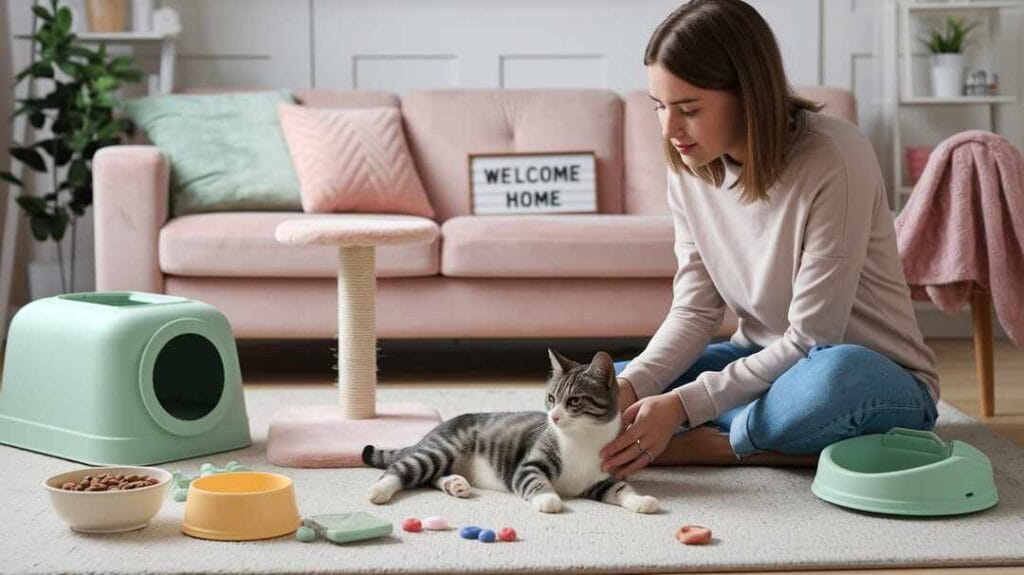
Introduction
Thinking of adopting a cat? Great choice—you’re about to make a lifelong friend. But before you start prepping toys and scratching posts, there’s one important hurdle to clear: the cat adoption application.
Yes, it can feel a little intimidating—maybe even like a job interview. But it doesn’t have to be. In fact, shelters and rescue groups aren’t trying to gatekeep your future feline soulmate—they’re simply making sure every cat finds a loving, stable home.
In this guide, we’ll walk you through the top cat adoption application tips, what rescues are really looking for, and how to make your application stand out—without needing to be “perfect.”
📌 Why Do You Need an Application to Adopt a Cat?
Animal rescues and shelters use applications to protect both cats and adopters. These forms help match the right cat to the right home—one that suits their personality, age, medical needs, and more.
Think of the application as a compatibility check, not a test. The goal is simple: a safe, loving forever home.
🧭 Understanding the Cat Adoption Process
Before you apply, it helps to know what to expect. While every organization is slightly different, most follow this general structure:
- Online Inquiry or Visit
- Adoption Application
- Phone Interview or Email Follow-up
- Reference and Vet Checks
- Home Visit (virtual or in-person)
- Adoption Approval + Fee Payment
- Meet & Greet (if not done earlier)
- Bringing Your Cat Home!
Let’s get into the part that matters most right now—your application.
✅ Top 10 Cat Adoption Application Tips to Get Approved
1. Be Honest About Your Lifestyle
Rescues don’t expect you to be home 24/7. They want to know how your lifestyle affects a pet’s routine. Be upfront about your work schedule, travel habits, and daily rhythm.
If you’re gone most of the day, mention how you’ll provide enrichment (like toys, scratching posts, or puzzle feeders). If you rent, disclose it—and share proof of pet permission if needed.
🐾 Pro tip: Honesty builds trust. Rescues know no one is perfect—but they want to see that you’re self-aware and responsible.
2. Show That You’re Prepared
Don’t wait until after approval to start thinking about care. List the supplies you already have or plan to buy: food bowls, litter box, scratching posts, comfy bedding, safe toys, etc.
Even a brief line like “We’ve already cat-proofed the apartment and set up a quiet space for a new cat” shows you’re not adopting on impulse.
3. Highlight Past Pet Experience (Even If Limited)
Have you lived with cats before? Raised a kitten? Cared for a friend’s pets? Fostered animals? Even if you’re not a lifelong cat person, show what you’ve learned and how you’ve prepared.
If this is your first time, that’s okay! Read on…
4. First-Time Owner? Show Your Readiness
If you’re new to cats, rescues want to see that you’ve done your homework. Mention:
- Books or blogs you’ve read
- Online research you’ve done
- Any friends or family who are mentoring you
- Local vet clinics you plan to use
🐾 Sample line: “Although I haven’t owned a cat before, I’ve been preparing for months and have consulted with experienced cat parents to ensure I’m fully ready.”
5. Clarify Everyone’s Role in the Household
Who lives with you? Who will feed, clean, and pay for the cat’s care?
Many rescues are wary of applications from households where it’s unclear who’s in charge of the pet’s well-being. Be clear about roles and expectations.
6. Explain How You’ll Handle Common Cat Behaviors
Most cats will scratch, hide, vomit, or knock something over at some point.
Rescues love seeing that you’ve considered this. Show understanding and patience:
- “We’ve set up vertical spaces and scratching posts.”
- “We know some cats need time to warm up and we’re prepared to give them space.”
- “We’ll use humane training and redirection, not punishment.”
7. Have a Long-Term Care Plan
Cats live 12–20+ years. A good application touches on how you’ll care for your cat over time:
- What happens if you move?
- Who would care for the cat in an emergency?
- Are you financially prepared for vet care?
Even short answers help paint a complete picture.
8. Don’t Skip the Vet Info Section
If you already have a vet, include their name and contact info. If not, list the clinic you plan to use.
Rescues want to know you value medical care—especially since many adopted cats come with recent vet records or may have ongoing needs.
9. Reference Checks: Be Proactive
Let your personal or professional references know to expect a call or email.
Tip: Choose people who know your living situation, values, or past pet care experience—like a landlord, roommate, or pet-sitting client.
10. Write a Sincere “Why” Section
If the application asks, “Why do you want to adopt a cat?” — don’t just say “I love animals.” Dig deeper.
Talk about:
- How long you’ve wanted a cat
- What kind of bond you’re looking for
- Why adoption matters to you
Heartfelt answers stand out.
👀 What Are Cat Rescues Really Looking For?
Here’s what makes a great adopter in the eyes of most rescues:
✅ Stable home environment
✅ Patience and realistic expectations
✅ Financial readiness for routine and emergency care
✅ Emotional commitment (especially during an adjustment period)
✅ No history of pet abandonment or impulse returns
✅ A willingness to learn and adapt
They’re not expecting perfection—just love and responsibility.
🏡 Preparing for the Home Visit (or Virtual Tour)
Rescues sometimes do a quick home check—not to judge your decor, but to confirm it’s safe for a pet.
Tips:
- Tidy up obvious hazards (dangling cords, toxic plants, etc.)
- Show where the cat will eat, sleep, and use the litter box
- Mention escape plans if you have balconies or open windows
- Be relaxed and friendly—it’s not a test!
🚫 Common Mistakes That Can Delay or Deny Approval
- Vague or incomplete answers
- Defensive tone or resistance to feedback
- Unrealistic expectations (e.g. “I want a cat that never scratches, is always affectionate, and never gets sick”)
- Adopting for someone else as a gift without their involvement
- Past history of pet rehoming with no explanation
💡 Final Thoughts: Your Dream Cat Is Worth the Effort
Yes, cat adoption applications can be thorough—but that’s because it matters. These animals have often already been through enough. Rescues want to give them the best chance at happily ever after.
Approach your application with honesty, care, and thoughtfulness. It’s not about being perfect—it’s about being prepared, open, and ready to build a meaningful bond with your future feline friend.
🐾 You’re not just adopting a cat. You’re offering them a forever home—and that’s something truly special.
Also Read - Cat Adoption for First-Time Owners: The Ultimate Guide to Becoming a Cat Parent
📝 FAQs:
Q: What will you do if the cat hides under the bed for weeks?
A: I’ll let them take their time, provide cozy hiding spots, and use scent bonding methods to help them feel safe.
Q: What if your cat scratches furniture?
A: I’ll provide vertical and horizontal scratching surfaces and redirect calmly—never punish.
Q: What happens if you need to move?
A: My cat will move with me. I’ve already researched pet-friendly rentals in my area.
Q: Will you declaw the cat?
A: Absolutely not. I understand that declawing is painful and inhumane. I’ll provide alternatives like scratching posts and nail trims.





Thanks for sharing. I read many of your blog posts, cool, your blog is very good.